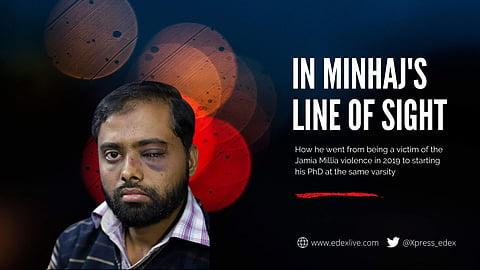

Two years ago, Mohammed Minhaj Uddin had the rest of his life figured out. A second-year LLM student at Jamia Millia Islamia, he was confident that the law was his ticket to a life worth living. And in one grisly night, all of that changed. It was December 15, 2019, a date that many students of Jamia at the time, and possibly after, are not likely to forget. At the height of the anti-CAA agitation, as campuses across India were besieged with protests, the Delhi Police barged into Jamia to curb the protestors.
During the offensive, they stormed the library. Unfortunately, that is where Minhaj was working on his dissertation that night. The cruel irony is that he wasn't even part of the protest. In fact, he says that though he supported the movement in spirit, he was never physically part of the demonstrations. He was lathicharged mercilessly by men whose faces remained covered with helmets, their name tags missing, and whose identity remains a mystery to date.
After lying on the floor for hours, Minhaj was rescued by fellow students. The way he looked at the world was shattered and he would possibly never look at it the same way again. Literally. "I am still getting used to not being able to see from one eye. At times I have to ask strangers on the road to help me navigate. It hurts when I look at the computer screen for too long and I cannot read physical books for long. The damage is permanent," Minhaj says. Two years on he still waits for justice and compensation while trying to regain a sense of normalcy.
But that didn't mean that he stopped. Far from it.
In fact, Minhaj's story came to the fore again during a recent media briefing at his varsity. JMI was awarded an A++ grade on December 15, 2021, by the National Assessment and Accreditation Council (NAAC). This is the highest grade given by NAAC to an institution. Following the development, the institute held a media briefing where Vice-Chancellor Najma Akhtar was asked a question on the gruesome events that unfolded on the same day two years ago and the impact it had had on students like Minhaj.
What followed was a response of hope from the VC: "Do you know where Minhaj is now? He is doing his PhD at this university," she said. "We encouraged him to come here, pursue a PhD and go into the judiciary. I'm sure that he will someday become a judge."
Powerful words. But how did Minhaj manage it? The aftermath of what happened in 2019 included a series of medical and legal consultations. While he confirmed to Edexlive that he was indeed approached by Akhtar to come back to JMI, he admits feeling very bittersweet about it. "I went back to my hometown in Bihar after the attack. The call from her (VC Najma Akhtar) came one year after the incident. My case was highlighted in the media and the VC was asked questions by reporters."
When encouraged to begin doing his PhD, he all but jumped at it. Minhaj counts himself as one of the few fortunate ones who could move back to Delhi and continue his education after the traumatic experience. "My family wouldn't send me back. It was only two months ago that I moved to Delhi. I want to get into academia," Minhaj says.
And how is he managing? "My stipend will begin now. There is coursework for the first three months and then the fellowship will come in." That accounts for the financial part, but what about physically and mentally? "I am trying to get back to normal, I cannot change what happened but it is only I who can decide what happens next," Minhaj says with conviction. He is quick to add that normalcy isn't as easy to find. "My eyes water and I can't work for a long time. It is more so difficult while travelling at night as I keep bumping into people."
Help also comes by way of simple hacks. For instance, his other visually-impaired friends suggest that he use the Job Access With Speech (JAWS) app that allows text-to-speech output. "That will hopefully not stress out my eye as much," he says.
Multiple victims of the attack, including Minhaj, are pinning their hopes on the outcome of the case in the Delhi High Court, but their cases remain pending. He added, "We still await compensation from the college and government authorities." What the students of Jamia went through is not uncommon in India and many have very little choice but to get back to normal as if nothing happened.
